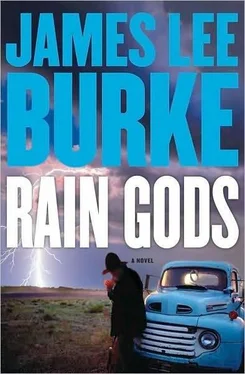“They didn’t say.”
“Did you give them my name?”
“I said your name was Vikki.”
“Did you give them my last name or tell them where I live?”
“I didn’t tell them where you live.”
“What are their names?”
“They left a card here. Or I think they did.” He looked behind him at two or three dozen business cards in a cardboard box under the cash register. “They liked your singing. One of them said you sounded like Mother something.”
“Maybelle?”
“What?”
“I sound like Mother Maybelle?”
“I don’t remember.”
“Stub-”
“Maybe they’ll come in tonight.”
“Don’t talk about me to anyone. No one, not for any reason. Do you understand?”
Stub shook his head and dried a glass, his back to her.
“Did you hear me?”
He sighed loudly, as though a great weight had been unfairly set on his shoulders. She wanted to hit him in the head with a plate.
Until nine-thirty P.M. she served dinners from the kitchen and drinks from the bar to tourists on their way to Big Bend and family people and lonely utility workers far from home who came in for a beer and the music. Then she took her guitar from a locked storage compartment in back and removed it from the case and tuned the strings she had put on only last week.
The Gibson had probably been manufactured over sixty years ago and was the biggest flattop the company made. It had a double-braced red spruce top and rosewood back and sides. It was known as the instrument of choice of Elvis and Emmylou or any rockabilly who loved the deep-throated warm sound of early acoustic guitars. Its sunburst finish and pearl and flower-motif inlay and dark neck and silver frets seemed to capture light and pools of shadow at the same time and, out of the contrasts, create a separate work of art.
When she made an E chord and ticked the plectrum across the strings, the reverberation through the wood was magical. She sang “You Are My Flower” and “Jimmie Brown the Newsboy” and “The Western Hobo.” But she could hardly concentrate on the words. Her gaze kept sweeping the crowd, the tables, the utility workers at the bar, a group of European bicyclists who came in sweaty and unshaved with backpacks hanging from their shoulders. Where was Pete? He was supposed to meet her at ten P.M., when the kitchen closed and she usually started cleaning tables and preparing to leave.
A man who was alone at a front table kept spinning his hat on his finger while he watched her sing; one side of his face was cut with a grin. He wore exaggerated hillbilly sideburns, cowboy boots, a print shirt that looked ironed on his tanned skin, jeans that were stretched to bursting on his thighs, and a big polished brass belt buckle with the Stars and Bars embossed on it. When she glanced at him, he gave her a wink.
Over the heads of the crowd, she saw Stub answer the phone. Then he replaced it in the cradle and said something to a drink waitress, who walked up to the bandstand and told Vikki, “Pete said to tell you not to eat dinner, he’s going to the grocery to fix y’all something.”
“He’s going to the grocery at ten o’clock?”
“They stay open till eleven. Count your blessings. My old man is watching rented porn at his mother’s house.”
Vikki laid her guitar in its case, fastened the clasps, and locked the case in the storage room. At closing time, Pete still had not shown up. She went to the bar and sat down, her feet hurting, her face stiff from smiling when she didn’t feel like it.
“Pretty fagged out?” a voice beside her said.
It was the cowboy with the Confederate belt buckle. He had not sat down but was standing close enough that she could smell the spearmint and chewing tobacco on his breath. He was holding his hat with both hands, straightening the brim, pushing a dent out of the crown, brushing a spot out of the felt. He put it on his head and took it back off, his attention focusing on Vikki. “You off?” he said.
“Am I what?”
“You need a ride? Every foot of wind out there has got three feet of sand in it.”
Stub compressed a small white towel in his palm and dropped it on the bar in front of the cowboy. “Last call for alcohol,” he said.
“Include me out.”
“Good, because this is a family-type joint that closes early. Then Vikki helps me clean up. Then I walk her home.”
“Glad to hear it,” the cowboy said. He put a breath mint in his mouth and cracked it between his molars, grinning while he did it.
Stub watched him leave, then set a cup of coffee in front of Vikki. “Those guys come back?” he asked.
“The ones who claim they’re with the Nitty Gritty Dirt Band?”
“You don’t believe they’re the genuine article?”
She was too tired to talk about it. She lifted her coffee cup, then replaced it in the saucer without drinking from it. “I won’t be able to sleep,” she said.
“You want me to walk you home?”
“I’m fine. Thanks for your help, Stub.”
He picked up a business card tucked under the register. “I dug this one out of the box,” he said. He set it in front of her.
She picked it up and looked at the printing across the face. “It says ‘Nitty Gritty Dirt Band.’”
“The guy wrote something on the back. I didn’t read it.”
She turned the card over in her palm. “It says he loved my singing.”
“Who?”
“Jeff Hanna. His name is right there.”
“Who’s Jeff Hanna?”
“The guy who founded the Nitty Gritty Dirt Band.”
She walked back to the motel. The stars had come out, and in the west, the bottom of the sky was still lit with a glow that was like a flare burning inside a green vapor. But she could take no comfort in the beauty of the stars and late-summer light on a desert plain. Each time a car or truck passed her, she unconsciously moved away from the asphalt, averting her face, her eyes searching for a sidewalk that led to a building, a driveway to a house, a swale that fronted a filling station.
Would they live this way the rest of their lives?
She unlocked her door and went inside her motel room. The air conditioner was cranked up all the way, moisture running down its side onto the rug. Pete had not returned from the grocery store, and she was exhausted and hungry and scared and incapable of thinking about the next twenty-four hours. Only Pete would choose to prepare a late and complicated dinner on the night they had to make a decision that would either confirm their status as permanent fugitives or place them in the hands of a legal system they didn’t trust.
She undressed and went into the shower and turned on the hot water. The steam rolled out of the stall in a huge cloud and fogged the mirror and glistened on the plaster walls and puffed through the partially open door into the bedroom.
When she had been a teenager, her father had always teased her about her love for stray animals. “If you’re not careful, you’ll find a fellow just like one of those cats or dogs and run off with him,” he had said.
Who had she found?
Pete, bumbling his way into the maw of mass murderers.
As she stared at her reflection through a small hole in the fogged mirror, she was stricken with shame and guilt by her own thoughts. Today was her birthday. She had forgotten it, but Pete had not.
She was filled with unrelieved anger at herself and the intractability of their situation. For the first time in her life, she understood how people could deliberately injure and even kill themselves. Their desperation didn’t have its origins in depression. The warm tub of water was cosmetic; the quick downward movement across the forearms was born out of rage at the self.
She got into the shower and washed her hair and lathered her breasts and underarms and thighs and abdomen and buttocks and calves, holding her face so close to the hot spray that her skin turned as red as a blister. How would they take back their lives? How would they free themselves from the fear that waited for them every morning like a hungry animal? The only sanctuary they had was a motel room with a clanking air conditioner dripping rust on the rug, a bed stained with the fornications of others, and curtains they could close on a highway that led back to a rural crossroads and a mass burial ground she couldn’t bear to think about.
Читать дальше












